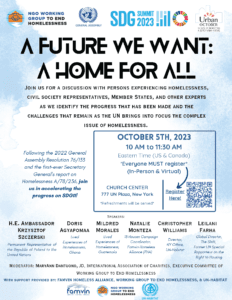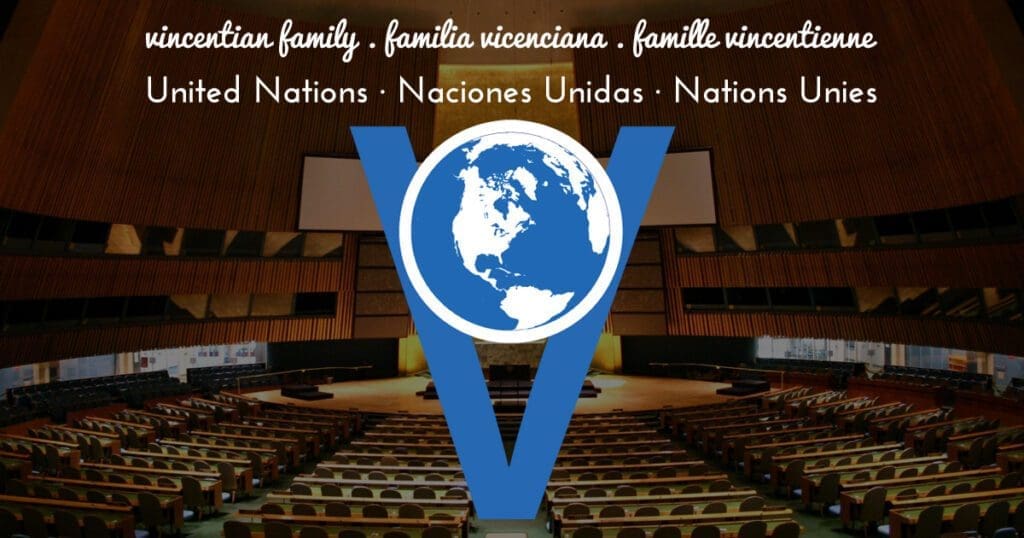There has been remarkable activity at the UN this fall. The General Assembly began their session in mid-September with high level meetings, a Social Development Summit, and meetings preparing for the Summit of the Future in 2024. As the session began it seemed that climate related damage was erupting around the world with floods, fires, and volcanos. Further, wars and conflicts are continuing to destroy human life and property in many areas, and there is an eroding trust in government, as well as greater polarization.
 The Vincentian Family at the UN continues to keep the conversation focused on “what must be done” to alleviate homelessness, an egregious form of poverty. We do this as the Member States and Secretariat increasingly use the term “polycrisis” to describe these times. In fact, it is the word of 2023. Yet we are aware that the present situation for persons without a home could be described as a polycrisis itself as “economic, environmental, social, and geopolitical crises are converging and conflating, creating an extremely volatile and uncertain future.” Millions continue to live in substandard housing, or are experiencing homelessness, or are at immediate risk of homelessness. According to the SDG 11 Synthesis Report 2023 roughly 2.8 billion people are estimated to be affected by different forms of housing inadequacy.
The Vincentian Family at the UN continues to keep the conversation focused on “what must be done” to alleviate homelessness, an egregious form of poverty. We do this as the Member States and Secretariat increasingly use the term “polycrisis” to describe these times. In fact, it is the word of 2023. Yet we are aware that the present situation for persons without a home could be described as a polycrisis itself as “economic, environmental, social, and geopolitical crises are converging and conflating, creating an extremely volatile and uncertain future.” Millions continue to live in substandard housing, or are experiencing homelessness, or are at immediate risk of homelessness. According to the SDG 11 Synthesis Report 2023 roughly 2.8 billion people are estimated to be affected by different forms of housing inadequacy.
The UN Secretary-General António Guterres’ report on homelessness to the 78th session of the UN General Assembly on September 28 is the first of its kind. This report updated the UNGA on “the progress that has been achieved and challenges that remain in the implementation of inclusive social development policies and programmes to address homelessness,” as required by General Assembly Resolution 76/133. We reviewed drafts of the Secretary General’s Report and participated in Webinars and Parallel events to discuss various issues such as Ending Global Homelessness through Data-Driven Policy Solutions: United Nations High-Level Political Forum Virtual Side Event on July 13, 2023. The discussion focused on raising awareness about homelessness, highlighting the need for better data, and encouraging the adoption of effective data collection and reporting methods at the local, national, and global levels.
 On October 5, the WGEH offered a Parallel event just following the SC Report to the UNGA. We gathered over 200 people, 50 attended at the Church Center on UN Plaza, while others attended virtually. The purpose of this event was to highlight the complexity of homelessness as experienced by women with children, review progress as shown in the Secretary General’s Report and recommit to moving this issue forward. In many ways the Vincentian Family played a prominent role in this event, from the planning, content and financial support of the FAMVIN Homeless Alliance. Natalie Monteza, Coordinator of the 13 Houses Campaign was a featured speaker and residents of the Daughters of Charity program AFAVI, in Seville, Spain for victims of Trafficking and Welcome Home Project located in Parramos, Guatemala helped us understand the difficulties women face who are homeless because of migrant trafficking and as a result of a natural disaster.
On October 5, the WGEH offered a Parallel event just following the SC Report to the UNGA. We gathered over 200 people, 50 attended at the Church Center on UN Plaza, while others attended virtually. The purpose of this event was to highlight the complexity of homelessness as experienced by women with children, review progress as shown in the Secretary General’s Report and recommit to moving this issue forward. In many ways the Vincentian Family played a prominent role in this event, from the planning, content and financial support of the FAMVIN Homeless Alliance. Natalie Monteza, Coordinator of the 13 Houses Campaign was a featured speaker and residents of the Daughters of Charity program AFAVI, in Seville, Spain for victims of Trafficking and Welcome Home Project located in Parramos, Guatemala helped us understand the difficulties women face who are homeless because of migrant trafficking and as a result of a natural disaster.
The panel included Ambassador Krzysztof Szczerski of Poland who spoke of a human rights framework approach to housing and a government’s obligation to respond to human rights holders. Poland has made increasing the supply of affordable housing for families a national priority in their plan to alleviate poverty. He also discussed the resettlement of millions of refuges (90% of whom are women with children) as a result of the war in Ukraine.
 Francesca De Ferarri Program Officer of UN Habitat encouraged our activities and the work of FAMVIN 13 Houses Campaign. She noted that domestic and gender-based violence is a cause of homelessness but women and children are less likely to live on the street, rather they are more likely to live with others without security of tenure and are the “Hidden Homeless.”
Francesca De Ferarri Program Officer of UN Habitat encouraged our activities and the work of FAMVIN 13 Houses Campaign. She noted that domestic and gender-based violence is a cause of homelessness but women and children are less likely to live on the street, rather they are more likely to live with others without security of tenure and are the “Hidden Homeless.”
The program concluded with Lelani Farha, Global Director of the Shift and former UN Special Rapporteur on the Right to Housing (2014-2020). The Shift was launched in 2017 with the UN Office of the High Commissioner for Human Rights and United Cities and Local Government. It works with multi-level stakeholders around the world. Leilani’s work is animated by the principle that housing is a social good, not a commodity. She has helped develop global human rights standards on the right to housing and spoke to the problems that the commercialization of housing has brought to poor communities.
We continue to advocate for the end of homelessness. It is certainly a polycrisis that effects nearly ¼ of the world’s people. The October 5 event and the progress we see at the UN on the issue shows what a group that shares a common mission and goal can accomplish when they work together. The FAMVIN Homeless Alliance and the Working Group to End Homelessness, a group of nearly 30 organizations who work to enable to voice of persons experiencing homelessness to be heard and to end homelessness through advocacy at the UN is a living testament to the teaching of St. Vincent—”We should assist the poor in every way and do it both by ourselves and by enlisting the help of others.”
MaryAnn Dantuono, International Association of Charities








Thanks for this report on the Family’s efforts toward ending homelessness
Sheila, Thank you for your comment. So glad to hear from you!
Thanks to you, Mary Ann and the Vincentian family at the UN, for this excellent presentation, and for your presence at all levels of negotiations on behalf of persons without housing.
Sr. Julie,
It is a labor of love. My privilege to do this work and to work with all the Vincentians at the UN and globally.